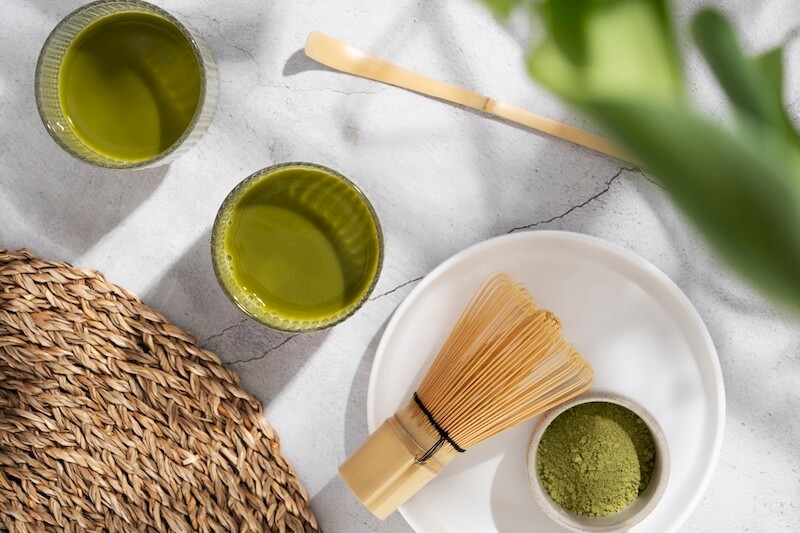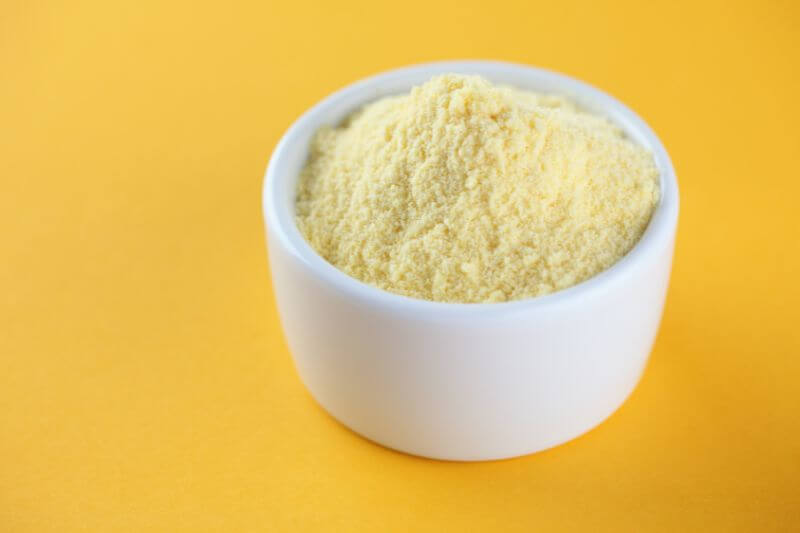Anti-aging, detoxifying, enhancing skin radiance, and providing natural energy… Matcha ticks all the boxes. This green tea powder from Japan is gaining popularity in France, from coffee shops to cosmetic brands. This wellness trend appeals to both healthy lifestyle enthusiasts and health professionals, as its benefits go well beyond mere fashion. Bursting with antioxidants, this ancient beverage works from within to maintain youthful skin, strengthen the immune system, and boost concentration. It’s a green tonic that many are already enjoying… and you should seriously consider it too.
Matcha, this powdered green tea from Japan, has become a staple in wellness trends. But beyond its “healthy” profile, vibrant color, and unique flavor, what are its real health benefits?
What Is Matcha?
Originating from Japan, matcha is a powdered green tea that has established itself as a global superfood. It’s prevalent in cafes, restaurants, cosmetics, and dietary supplements, appealing to all age groups.
The popularity of matcha can be attributed to its numerous benefits, unique vegetal taste, and versatility. Whether in lattes, smoothies, or baked goods, it fits seamlessly into various recipes. This is not just a fleeting trend; it represents a genuine move towards healthier and more natural consumption.
Six Benefits of Matcha: A Concentrated Source of Goodness
1. Extremely Rich in Antioxidants
Due to its shade-grown cultivation and consumption in powdered form, matcha is highly concentrated in antioxidants, particularly EGCG (epigallocatechin gallate). This powerful antioxidant combats inflammation, cellular aging, and chronic diseases.
2. A Concentration Booster
The combination of caffeine and L-theanine enhances focus without the undesirable effects associated with coffee. This results in stable energy, a clearer mind, and improved concentration.
3. A Heart and Weight Management Ally
The polyphenols in matcha help regulate cholesterol and blood sugar levels while boosting metabolism. It supports weight loss and enhances cardiovascular health.
4. A Source of Calm and Vitality
L-theanine promotes a state of calm without inducing drowsiness, making it perfect for staying serene while maintaining energy.
5. Anti-Aging and Detox Benefits
Chlorophyll detoxifies the body, while catechins help slow down skin aging. Matcha contributes to keeping skin radiant and the body healthy.
Four Simple Steps to Prepare Matcha at Home
You don’t need a bamboo whisk or special bowl to make matcha at home. Here’s a quick and easy method:
- Measure Matcha: Use 1 to 2 grams (about 1/2 teaspoon) of matcha.
- Hot Water: Heat water to about 70-80°C, without boiling it.
- Mix: Use a regular whisk, fork, or even a shaker to mix the powder well to avoid clumps.
- Enjoy: Sip it plain or add a splash of plant-based milk (like vanilla almond) to taste.
This straightforward preparation retains all the beneficial properties of matcha, providing you with its antioxidant, detoxifying, and anti-aging effects without needing complex equipment.
Ways to Incorporate Matcha into Your Routine
Matcha can easily be added to various recipes to enjoy its benefits throughout the day. Here are some simple ideas:
- Matcha Latte: Blend prepared matcha with plant-based milk for a creamy, energizing drink.
- Smoothies: Toss in a scoop of matcha to your morning smoothie for an antioxidant boost.
- Desserts: Incorporate it into cakes, cookies, or granola for a unique flavor and healthy touch.
- Porridge and Bowl Cakes: Add it to your cereal bowls or porridge for a nutritious breakfast.
- These straightforward recipes allow you to effortlessly add matcha to your diet while maximizing its health benefits.
What About the Bitterness?
While matcha’s flavor can be surprising due to its vegetal bitterness, sometimes earthy, don’t let that initial impression deter you. The taste largely depends on the quality of matcha used: premium varieties, usually from the first harvest, tend to have a milder flavor with little to no bitterness. There are matchas more palatable even for novices. The key is to choose your product wisely!
Important Note
Though matcha offers numerous benefits, excessive consumption can lead to negative side effects. It is recommended to limit intake to 2 to 4 grams of matcha per day, or about 1 to 2 cups, to avoid risks such as hypertension, digestive issues, or drug interactions. If in doubt, consult a healthcare professional before incorporating matcha into your daily routine.







